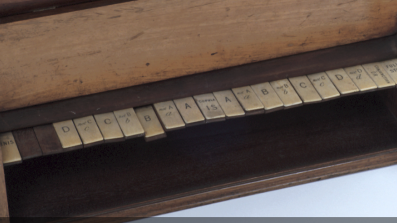You can't move (or read) for mention of artificial intelligence. And while we may only have a vague idea of what AI is, we know for sure that it is revolutionary and that it is new.
Except it isn't. Think Mary Shelley's creation in ‘Frankenstein’. How about Victorian Charles Babbage's 'Difference Engine', feted as the forerunner of the computer. Babbage’s collaborator Ada Lovelace understood how it might weave patterns and compose music, as well as crunch numbers.
Or look at Stanley Jevons's remarkable mechanical 'logic piano' from the 1860s, which seemed to reduce the operations of the brain to wood and wire (pictured below).
'Imagining AI' places artificial intelligence in its historical context via displays, lectures and demonstrations. You are all welcome to join us in the Bodleian's Weston Library, and the History of Science Museum.
9th September - Workshop and Exhibition
10th September - Demonstrations and Displays


